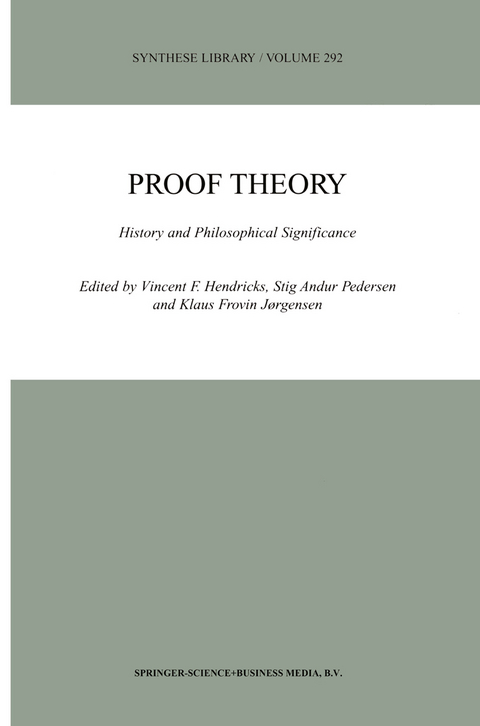
Proof Theory
History and Philosophical Significance
Seiten
2000
Springer (Verlag)
978-0-7923-6544-0 (ISBN)
Springer (Verlag)
978-0-7923-6544-0 (ISBN)
hiS volume in the Synthese Library Series is the result of a conference T held at the University of Roskilde, Denmark, October 31st-November 1st, 1997. The aim was to provide a forum within which philosophers, math ematicians, logicians and historians of mathematics could exchange ideas pertaining to the historical and philosophical development of proof theory. Hence the conference was called Proof Theory: History and Philosophical Significance. To quote from the conference abstract: Proof theory was developed as part of Hilberts Programme. According to Hilberts Programme one could provide mathematics with a firm and se cure foundation by formalizing all of mathematics and subsequently prove consistency of these formal systems by finitistic means. Hence proof theory was developed as a formal tool through which this goal should be fulfilled. It is well known that Hilbert's Programme in its original form was unfeasible mainly due to Gtldel's incompleteness theorems. Additionally it proved impossible to formalize all of mathematics and impossible to even prove the consistency of relatively simple formalized fragments of mathematics by finitistic methods. In spite of these problems, Gentzen showed that by extending Hilbert's proof theory it would be possible to prove the consistency of interesting formal systems, perhaps not by finitis tic methods but still by methods of minimal strength. This generalization of Hilbert's original programme has fueled modern proof theory which is a rich part of mathematical logic with many significant implications for the philosophy of mathematics.
1. Review of Proof Theory.- Highlights in Proof Theory.- 2. The Background of Hilbert’s Proof Theory.- The Empiricist Roots of Hilbert’s Axiomatic Approach.- The Calm Before the Storm: Hilbert’s Early Views on Foundations.- Toward Finitist Proof Theory.- 3. Brouwer and Weyl on Proof Theory and Philosophy of Mathematics.- The Development of Brouwer’s Intuitionism.- Did Brouwer’s Intuitionistic Analysis Satisfy its own Epistemological Standards?.- The Significance of Weyl’s Das Kontinuum.- Herman Weyl on the Concept of Continuum.- 4. Modern Views and Results from Proof Theory.- Relationships between Constructive, Predicative and Classical Systems of Analysis.
| Erscheint lt. Verlag | 30.9.2000 |
|---|---|
| Reihe/Serie | Synthese Library ; 292 |
| Zusatzinfo | XII, 257 p. |
| Verlagsort | Dordrecht |
| Sprache | englisch |
| Maße | 156 x 234 mm |
| Themenwelt | Geisteswissenschaften ► Philosophie ► Allgemeines / Lexika |
| Geisteswissenschaften ► Philosophie ► Logik | |
| Mathematik / Informatik ► Mathematik ► Logik / Mengenlehre | |
| ISBN-10 | 0-7923-6544-5 / 0792365445 |
| ISBN-13 | 978-0-7923-6544-0 / 9780792365440 |
| Zustand | Neuware |
| Informationen gemäß Produktsicherheitsverordnung (GPSR) | |
| Haben Sie eine Frage zum Produkt? |
Mehr entdecken
aus dem Bereich
aus dem Bereich
die letzten Jahre der Philosophie und der Beginn einer neuen …
Buch | Hardcover (2024)
Klett-Cotta (Verlag)
28,00 €
Gesundheitsschutz, Selbstbestimmungsrechte, Rechtspolitik
Buch | Softcover (2024)
Kohlhammer (Verlag)
39,00 €
Konfuzianismus, Daoismus, Buddhismus
Buch | Softcover (2023)
C.H.Beck (Verlag)
18,00 €


